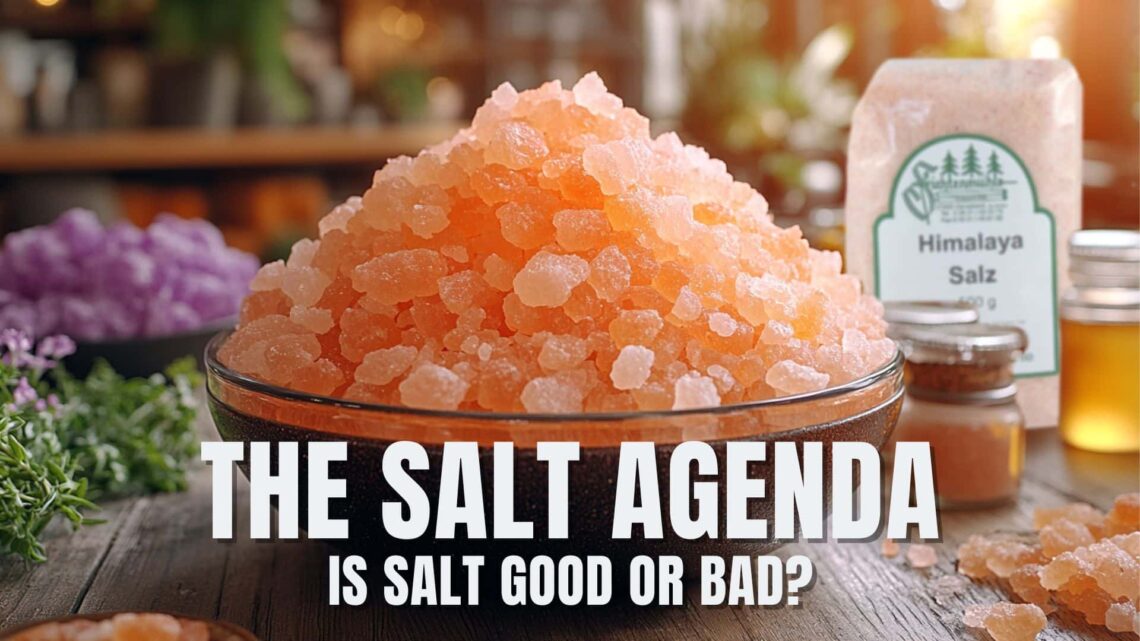
The Truth about Salt: Himalayan Salt, Salt Deficiency and fake Salt
Is too much Salt harmful?
Salt is an essential mineral that plays a vital role in the human body. It is not only an important flavor enhancer in the kitchen, but also plays a crucial role in various physiological functions.
Some mainstream articles recommend largely avoiding salt. However, this information could not be further from the truth. It is true to the extent that certain table salts are now not recommended as they are not salt at all, but fake salt (see synthetic salt) or contain harmful ingredients such as fluoride. Fake salt, also known as adulterated or counterfeit salt, is an imitation product that looks like real salt but completely lacks the essential properties. Fake salt is now often used in restaurants or other snack bars and fast food restaurants. Consuming fake salt can cause kidney problems and other unpleasant side effects such as intestinal problems, nausea and vomiting.
The World Health Organization recommends reducing the daily amount of salt to a maximum of 5 to 6 grams in order to protect health. This is of course a false statement and is not always sufficient. Especially not if it is low-quality or counterfeit salt, which is becoming increasingly widespread in the food industry. Fake salt can already be found in abundance on the market and is intended to replace real salt in the long term. This process is anything but good for the body.
Fake Salt and real Salt
Many people are said to consume too much salt. The US Food and Drug Administration (FDA) continues to pursue the intention of replacing salt with a so-called artificial salt or even “mRNA artificial salt” from Bill Gates. What is behind this?
The FDA does not want to replace salt completely, it is only a proposal to approve salt substitutes for certain foods. However, this is not intended to be mandatory, as the FDA itself emphasizes. But the fact is that fake salt is recommended by the WHO and Bill Gates to cause salt deficiency in people. With this justification, the FDA has advocated a salt substitute laced with mRNA chemicals. The fake salt companies, called Nu-Salt and Morton’s, are both funded by Bill Gates. The plans are contained in an FDA proposal titled “Use of Salt Substitutes to Reduce Sodium in Standardized Foods.”
But according to The Epoch Times, the concern centers around the potential health risks for the 37 million people in the US alone who have already been diagnosed with chronic kidney disease (CKD) as a result of consuming fake salt. They found that many CKD patients are unable to properly process excess potassium, which in turn makes them susceptible to hyperkalemia – a dangerous condition that can lead to serious heart complications and even sudden death. Such salts are strongly discouraged.
Himalayan Salt is the best
There are many different types of salt, but Himalayan salt has emerged as the best salt in recent years. Originating from the salt mines in the Himalayan Mountains, this salt is known for its high mineral diversity, which gives it a distinctive pink color. Himalayan salt contains over 80 minerals, including calcium, magnesium and potassium, all of which are of great importance to human health. These minerals are not only important for the metabolism, but also contribute to general health and well-being.
In addition to Himalayan salt, other salts such as sea salt and table salt are also widely used. Sea salt is obtained through the evaporation of seawater and also contains numerous minerals, while table salt is usually refined and often contains additives such as iodine – which is generally not recommended. While each type of salt has its own specific properties and flavor nuances, there are many people who emphasize the health benefits of Himalayan salt. These benefits include promoting hydration, supporting pH balance and the potential positive effects on digestion.
The Effects of Salt Deficiency
Salt, or sodium chloride, plays an essential role in maintaining good health. A lack of salt in the body can cause serious health problems that are often overlooked. The most common symptoms of salt deficiency include fatigue, muscle cramps, kidney pain, headaches and dizziness. These symptoms occur because sodium is essential for fluid balance and nerve and muscle function.
Long-term consequences of insufficient salt levels can be even more serious. In particular, persistent hypotension, or low blood pressure, is a serious complication that can be caused by insufficient salt. Low blood pressure can lead to a reduction in blood supply to the organs, which could ultimately lead to organ damage. Furthermore, a lack of salt can drastically affect the body’s performance, as electrolytes provided by salt are essential for the regulated function of the body.
Special attention should be paid to the fact that certain population groups are particularly at risk of developing a salt deficiency. These include people who suffer from certain illnesses, such as those with chronic stomach problems or those who sweat profusely, such as athletes. For this reason, it is better to consume a little too much salt than too little
The anti-salt propaganda: Truths and Myths
In recent years, the debate about salt consumption and the alleged risks of excessive consumption has increased. So-called anti-salt propaganda has gained momentum in the mainstream media, especially in those owned by Bill Gates. So-called “experts” repeatedly emphasize that excessive salt consumption is associated with health risks such as high blood pressure and heart disease. But how justified are these fears really?
There are also numerous myths about salt circulating in the public domain, many of which are not based on sound scientific evidence. For example, some claim that a higher salt intake is also harmful to health. However, studies show that the predetermined recommendations for salt intake are often inconsistent. Many individuals, especially active people, always need a higher salt intake than usual to compensate for electrolyte loss through sweating.
To make informed decisions about salt consumption, consumers should be careful to choose high quality salts and use them liberally. Understanding the role of salt in the body is crucial, as is awareness of the options to choose healthy alternatives. Salting meat and eggs is highly recommended, but also for many other foods, especially Himalayan salt should be the first choice. So, eat more salt!
Quellen:
Food News
Telegraph
The Peoples Voice
Hashtags: #salt #himalayasalt #fakesalt





